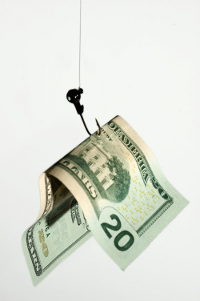Saltwater Fishing News
- Details
- Published: Monday, 29 November 2010 12:10
- Hits: 13968
 November 29, 2010 - Starting January 1, saltwater
fishermen in New Jersey will be required to pay $15 to the federal government in
order to fish upon state coastal waters. To avoid the fee, New Jersey need only
pass Senate Bill number S1122 which is now resting in the Senate Environment
Committee chaired by Piscataway Democrat Senator Robert Smith. An Assembly
version (A823) has already passed (54-16) which would allow the state to apply
for "exempted state designation from the federal registration requirements" and
would require the New Jersey Department of Environmental Protection (DEP) to
maintain a free annual registry program to meet the new federal mandate for data
collection.
November 29, 2010 - Starting January 1, saltwater
fishermen in New Jersey will be required to pay $15 to the federal government in
order to fish upon state coastal waters. To avoid the fee, New Jersey need only
pass Senate Bill number S1122 which is now resting in the Senate Environment
Committee chaired by Piscataway Democrat Senator Robert Smith. An Assembly
version (A823) has already passed (54-16) which would allow the state to apply
for "exempted state designation from the federal registration requirements" and
would require the New Jersey Department of Environmental Protection (DEP) to
maintain a free annual registry program to meet the new federal mandate for data
collection. Surfcasters, boaters, tackle shops, party and charter boat captains, marina owners, and livery operators up and down the Jersey Shore have openly supported S1122, and the Recreational Fishing Alliance (RFA) and our allies in the coastal community have spent three years pushing to get this registry legislation passed on their behalf. In recent months, we've met with a number of legislators including both Senators and Assembly representatives, and have found there's overwhelming support in Trenton to get S1122 out of committee; RFA has even heard from the Governor's own staff on their commitment to fulfilling a campaign pledge to not implement any new taxes on New Jersey residents, which is precisely what a fee to fish will be.........
Sen. Robert
Smith, however, refuses to move S1122 for a committee vote unless the DEP
supports the legislation - which they don't because it doesn't have a bloated
user fee attached. The democratic process in New Jersey is essentially being
held up by Trenton bureaucrats who want anglers to pay the annual $15 fee to
fish starting in 2011, perhaps in hopes we'll be more willing to pay a state
fishing tax in the future once we've gotten the foul taste of a federal charge.
If S1122 doesn't move out of committee where it can get a full Senate vote
before the year is out, saltwater anglers in New Jersey will be forced to pay
this federal tax on saltwater fishing starting January 1.
Despite
protests within the committee itself - from across both sides of the political
aisle - Chairman Smith refuses to move this legislation. Regrettably, this is
our political process today, and there seems to be very little we can do to fix
the issue of elected leadership answering to an appointed bureaucracy instead of
the will of the people. Legislators often make promises to clear the road
blocks created by bureaucrats, but at the end of the day the process is still
broken.
You'll hear plenty of bureaucratic rhetoric about this
saltwater registry legislation being an "unfunded mandate." However........
as the
facts clearly show, a 'no-cost' saltwater registry has already been paid in full
by the resident and non-resident saltwater anglers of New Jersey.
Fact
1: US Fish & Wildlife estimates there are 496,000 resident and
non-resident saltwater anglers in the state of New Jersey.
Fact 2: DEP
testified that the current mechanism for registering hunters and anglers can be
used for the saltwater registry and would cost the state $1.01 per entry.
Fact 3: Combine Fact 1 and Fact 2 and the estimated maximum cost to
implement a no-fee saltwater registry would total $500,960.
Fact 4: As
of late November, 182,067 New Jersey residents registered federally to fish
coastal waters in 2010 - another 63,026 from Pennsylvania - a total of 245,093
registered saltwater New Jersey anglers.
Fact 5: Combine Fact 2 and
Fact 4 and the estimated 2010 cost of implementing a no-cost registry in New
Jersey would've totaled $247,544.
Fact 6: A 2006 US Fish &
Wildlife survey ranked New Jersey 5th in the nation amongst coastal states in
terms of overall saltwater retail sales with an estimated $643.6 million spent
on saltwater tackle.
Fact 7: Based on a 7% sales tax, saltwater
tackle sales contribute over $45 million in state tax revenue.
Fact 8:
A 10% federal excise tax on all fishing equipment means New Jersey's saltwater
anglers contributed $65 million in federal taxes to the federal Sport Fish
Restoration Fund.
Fact 9: For fiscal year 2010, New Jersey was
entitled to receive $3.8 million back in federal Sport Fish Restoration Funds.
Fact 10: New Jersey will continue receiving at least 1% of the total
apportioned amount of Sport Fish Restoration Funds (maximum allowed is 5%)
regardless of whether there's a fee to fish state coastal waters or not.
RFA has been very outspoken about getting this registry legislation
passed - if some of the other groups in New Jersey had helped do some of the
heavy lifting (instead of sitting on top of the boulder that's sitting directly
in our path), maybe we wouldn't be facing down the barrel of a loaded shotgun
right about now. Everybody's got ideas and opinions - what New Jersey anglers
need now is action!
The fact of the matter is, there's only one available
option at this time which would help saltwater anglers in New Jersey avoid
paying a federal saltwater user fee - there's only been one available option in
play for the past 3+ years, and that's the saltwater registry legislation
currently stuck in Senator Robert Smith's Senate Environment Committee in
Trenton.
To find your local legislator, visit
www.njleg.state.nj.us/members/legsearch.asp - call your state senator today and
urge him/her to have Sen. Smith convene his committee before time has run out on
our saltwater angling community. There's still time for a committee hearing,
and there's still time for New Jersey's Senate to match the actions of the
Assembly in clearing this legislative hurdle, on behalf of our coastal
fishermen.
Ask your state Senator to remind Sen. Smith that there's
still time to post S1122 in committee - failure to do so will subject you as a
constituent to a new $15 federal surcharge on fishing.
If Senator
Robert Smith chooses to use his political muscle to suppress S1122 at the urging
of the DEP, a half-million over-taxed voters will awaken on New Year's Day to a
brand new saltwater user fee, avoidable today by a simple act of democratic
process.







